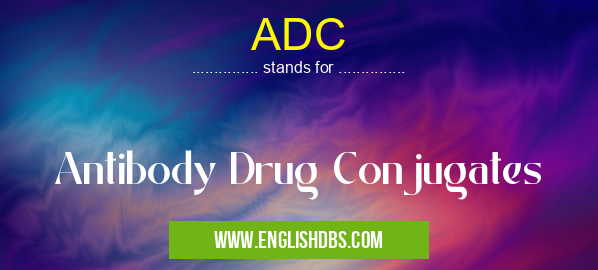What does ADC mean in MEDICAL
ADCs are a relatively new type of cancer therapy, but they have shown promise in clinical trials. They are particularly effective against cancers that are difficult to treat with traditional chemotherapy, such as breast cancer, lung cancer, and ovarian cancer.

ADC meaning in Medical in Medical
ADC mostly used in an acronym Medical in Category Medical that means Antibody Drug Conjugates
Shorthand: ADC,
Full Form: Antibody Drug Conjugates
For more information of "Antibody Drug Conjugates", see the section below.
ADC Meaning in MEDICAL
ADC stands for Antibody Drug Conjugates. ADCs are a type of targeted cancer therapy that combines an antibody with a cytotoxic drug. The antibody is designed to bind to a specific protein on the surface of cancer cells, while the cytotoxic drug is designed to kill the cancer cells.
How do ADCs work?
ADCs work by binding to a specific protein on the surface of cancer cells. The antibody portion of the ADC is designed to recognize and bind to a specific protein that is overexpressed on cancer cells. Once the ADC is bound to the cancer cell, the cytotoxic drug is released, killing the cancer cell.
Benefits of ADCs
ADCs have several advantages over traditional chemotherapy. First, they are more targeted than chemotherapy, meaning that they are less likely to damage healthy cells. Second, ADCs are often more effective than chemotherapy against cancer cells that are resistant to traditional chemotherapy. Third, ADCs can be used to deliver higher doses of cytotoxic drugs to cancer cells than is possible with traditional chemotherapy.
Essential Questions and Answers on Antibody Drug Conjugates in "MEDICAL»MEDICAL"
What are Antibody Drug Conjugates (ADCs)?
ADCs are a type of targeted cancer therapy that combines a monoclonal antibody with a cytotoxic agent (payload). The antibody is designed to bind to a specific target on cancer cells, while the payload is intended to kill the cells by disrupting cell division or causing cell death.
How do ADCs work?
ADCs work by delivering the cytotoxic payload specifically to cancer cells. The antibody binds to the target on the cancer cell, and the payload is then released into the cell, where it can exert its cytotoxic effect. This targeted approach aims to spare healthy cells from the toxic effects of the payload.
What are the advantages of ADCs?
ADCs offer several advantages over traditional chemotherapy:
- Targeted delivery: ADCs can specifically target cancer cells, reducing damage to healthy cells.
- Increased potency: Linking a cytotoxic payload to an antibody enhances the potency of the therapy, allowing lower doses of the payload to be used.
- Improved efficacy: ADCs can bypass drug resistance mechanisms that often develop with traditional chemotherapy.
What are the limitations of ADCs?
One potential limitation of ADCs is that they can be more expensive to produce than traditional chemotherapy drugs. Additionally, some ADCs may have a narrow therapeutic window, meaning that the difference between an effective dose and a toxic dose is small.
Who are ADCs approved for?
ADCs have been approved for the treatment of various types of cancer, including breast cancer, lung cancer, and lymphoma. The specific targets and indications for each ADC vary.
What are the potential side effects of ADCs?
The potential side effects of ADCs vary depending on the specific ADC and the individual patient. Common side effects can include nausea, vomiting, fatigue, and low blood counts. More severe side effects, such as infusion reactions and organ damage, are less common.
What is the future of ADC development?
The field of ADC development is rapidly advancing, with research ongoing to improve the efficacy, safety, and targeting capabilities of ADCs. New and innovative ADCs are being evaluated in clinical trials, and ongoing research aims to expand their potential applications in cancer treatment.
Final Words: ADCs are a promising new type of cancer therapy that has shown promise in clinical trials. They are more targeted than traditional chemotherapy, meaning that they are less likely to damage healthy cells. They are also often more effective than chemotherapy against cancer cells that are resistant to traditional chemotherapy. ADCs are still in development, but they have the potential to revolutionize the treatment of cancer.
ADC also stands for: |
|
| All stands for ADC |
